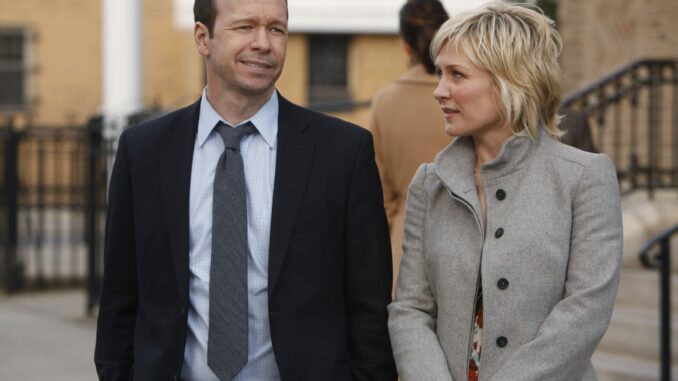
 Crime dramas have long captivated audiences with their suspenseful storytelling, complex characters and high-stakes investigations. While many shows hit their peak early and struggle to maintain momentum, a rare few defy the odds. They evolve in quality and depth as the seasons progress. These long-running crime dramas don’t just endure. They improve, building richer narratives, refining their tone and exploring more ambitious themes with time.
Crime dramas have long captivated audiences with their suspenseful storytelling, complex characters and high-stakes investigations. While many shows hit their peak early and struggle to maintain momentum, a rare few defy the odds. They evolve in quality and depth as the seasons progress. These long-running crime dramas don’t just endure. They improve, building richer narratives, refining their tone and exploring more ambitious themes with time.
Criminal Minds Evolves from Formulaic to Fearlessly Character-Driven
A Procedural That Sharpens Its Profiling With Grit & Depth
At first glance, Criminal Minds follows a predictable FBI profiler formula. As the seasons go on, the show takes surprising narrative risks, diving deeper into the psychological toll of hunting serial killers. Its most compelling arcs come in later seasons, when characters like Reid (Matthew Gray Gubler), Hotch (Thomas Gibson), and Garcia (Kirsten Vangsness) are pushed into darker, more personal territory.
The team dynamics mature and serial storylines grow more layered. Similarly, the crimes themselves become more intricate and disturbing. Crucially, Criminal Minds learns to balance its episodic cases with long-running continuity. What starts as a textbook procedural grows into a compelling exploration of trauma, resilience and the weight of empathy in the face of monstrosity. With each season, the show not only refines its formula but dares to break it.
NCIS Strengthens Its Team and Storytelling With Time
Longevity Turns Familiarity into Strengt
NCIS didn’t become a staple overnight. In its early years, it was a straightforward Navy crime procedural with a charming cast and a few running jokes. Over time, it builds a deeply connected team dynamic that gives the show surprising emotional weight. Characters like Gibbs (Mark Harmon), Tony (Michael Weatherly), McGee (Sean Murray) and Abby (Pauley Perrette) grow beyond their archetypes.
As a result, the show dares to invest in long-term arcs involving loss, betrayal, and justice. It also masters the balance between humor and heartbreak with each passing season. Later seasons introduce new characters who bring fresh energy without disrupting the core chemistry. Likewise, the writing gets bolder with themes, like international espionage and cybercrime. Far from running out of steam, NCIS learns to lean into its strengths.
The Closer Became a Standout Procedural That Just Getting Better
The Closer Sharpens Its Focus With Every Interrogation
The Closer starts as a clever twist on the crime procedural formula, with Deputy Chief Brenda Leigh Johnson (Brenda Leigh Johnson) using Southern charm and psychological savvy to extract confessions. What could’ve remained a formulaic setup instead blossoms into one of TV’s most tightly written and emotionally nuanced crime dramas. The show expands its scope with each season. It moves beyond confession-room theatrics into morally ambiguous territory that challenges both characters and viewers.
Brenda’s personal and professional lives begin to collide, revealing her vulnerabilities and moral blind spots. As internal politics and ethical dilemmas intensify, The Closer becomes less about solving cases and more about the cost of justice. Sedgwick’s performance anchors the show with intelligence and intensity. By its final season, The Closer has evolved into a masterclass in tension, character development and procedural storytelling.
Longmire Matures Into a Western Procedural With Soul
A Slow Start Gives Way to Rich Storytelling and Emotional Weight
Longmire begins quietly, with a traditional crime-of-the-week format set against the sweeping Wyoming landscape. As the series progresses, it deepens dramatically, incorporating Native American sovereignty, political tension and personal grief into its investigations. Sheriff Walt Longmire (Robert Taylor) evolves from a stoic law officer into a layered, often haunted figure.
When the series moves to Netflix after its third season, it embraces more serialized storytelling and darker subject matter, further elevating the narrative. By its conclusion, Longmire feels less like a procedural and more like a character study in the guise of a Western mystery. It is a show that earns its place by getting better with every step.
Hawaii Five-0 is a Surprisingly Heartfelt Reboot
From Explosive Action to Meaningful Arcs
The reboot of Hawaii Five-0 launches with an emphasis on sun-soaked shootouts, fast cars and high-tech action. It’s fun, flashy, and formulaic but that changes. Over time, the show finds unexpected emotional resonance, transforming into a character-driven procedural with genuine heart. Steve McGarrett (Alex O’Loughlin) and Danny Williams (Scott Caan) develop a complex, brotherly bond that anchors the series. Similarly, the supporting cast adds depth, diversity and evolving backstories.
Later seasons explore family legacies, PTSD, grief, loyalty, and justice beyond the badge. The cases stay exciting, but the real strength becomes the team’s chemistry and moral challenges. What begins as a high-energy remake grows into a show about belonging, redemption and sacrifice. By the end of its 10-season run, Hawaii Five-0 leaves an emotional imprint. It proves that even reboots can find their own voice and rise above expectations.
Blue Bloods Quickly Became a Fan-Favorite & For Good Reason
A Procedural that Becomes More About Values than Just Verdicts
Blue Bloods is a show about a multigenerational law enforcement family in New York City. Early seasons often play it safe with traditional case-of-the-week formats. As the series progresses, however, it leans more into the moral, political and personal complexities of policing. What sets it apart is its signature family dinner scene, which evolves into a platform for nuanced, timely discussions on real-world issues.
Each Reagan family member faces dilemmas that test their beliefs and bring emotional depth to the show. Later seasons explore shifting power dynamics, legacy burdens and the generational divide in law enforcement. These storylines give Blue Bloods a compelling maturity that transcends its procedural roots. Rather than growing stale, the series uses its longevity to develop characters with grace and challenge their convictions.
Bones Transforms From Quirky Casework to Emotional Catharsis
The Science Stays Sharp, but the Heart Grows Deeper
Bones leans heavily into its odd-couple dynamic. Brilliant but socially awkward forensic anthropologist Temperance “Bones” Brennan (Emily Deschanel) teams with intuitive FBI agent Seeley Booth (David Boreanaz). The early seasons balance light procedural fare with witty banter, but as the show matures, so do its characters and themes. Brennan and Booth’s relationship deepens. Additionally, the ensemble cast is given space to grow emotionally and professionally.
The cases remain engaging, but it’s the show’s increasing willingness to tackle loss, loyalty and personal trauma that elevates it. Bones also starts integrating multi-episode arcs and long-running villains, allowing for richer tension and suspense. By the final seasons, what started as a quirky procedural becomes a fully realized character drama wrapped in science and mystery. The show defies the typical trajectory of long-running and evolves into something far more rewarding.
Chicago P.D. Grows Grittier and More Complex
A Standard Police Drama Evolves into a Study of Moral Compromise
Early in its run, Chicago P.D. offers gritty, fast-paced casework with a clear line between cops and criminals. As the seasons progress, the show blurs those lines, particularly through the morally gray leadership of Hank Voight (Jason Beghe). Later seasons dive deeper into the ethical ambiguity of policing in a modern city. It explores issues like corruption, racial injustice, loyalty and accountability.
The writing matures with storylines increasingly tied to real-world tensions and layered, serialized plots. Chicago P.D. isn’t afraid to question its own heroes, and that self-awareness gives it unexpected depth. Rather than settle into procedural comfort, Chicago P.D. challenges itself and its viewers by embracing the evolving complexities of law enforcement in the 21st century. It’s a procedural that turns its grit into gravitas.
CSI: Crime Scene Investigation Becomes Smarter and Sleeker With Every Twist
The Original Forensic Procedural Finds Sophistication in the Storytelling
When CSI debuted, it revolutionized TV with its stylish forensics and slick editing. As the series grew, so did its storytelling confidence. The early seasons are engaging, but largely episodic. Later seasons, however, develop deeper character arcs, more morally ambiguous cases, and storylines that explore the limits of science and justice. Characters evolve beyond their roles as crime-solvers, revealing personal vulnerabilities and ethical dilemmas.
The show also refines its visual language, becoming more restrained and cinematic. With recurring villains like the Miniature Killer and more serialized arcs, CSI proves it’s not just flash; it’s substance, too. The storytelling grows bolder and more introspective, especially as it nears its finale and film. CSI builds on its legacy, becoming a smarter and more compelling version of itself over time.
Law & Order: Special Victims Unit Aged Like Fine Wine
A Spin-Off Grows into a Powerhouse of Emotional and Social Depth
When Special Victims Unit (SVU) first aired, it largely followed the crime-procedural blueprint of its predecessor, Law & Order. Over time, it carves out its own legacy by shifting the focus from just solving crimes to exploring the long-term impact on victims and survivors. Olivia Benson (Mariska Hargitay) becomes the emotional core of the series. Her evolution from detective to captain mirrors the show’s increasing commitment to character-driven stories.
